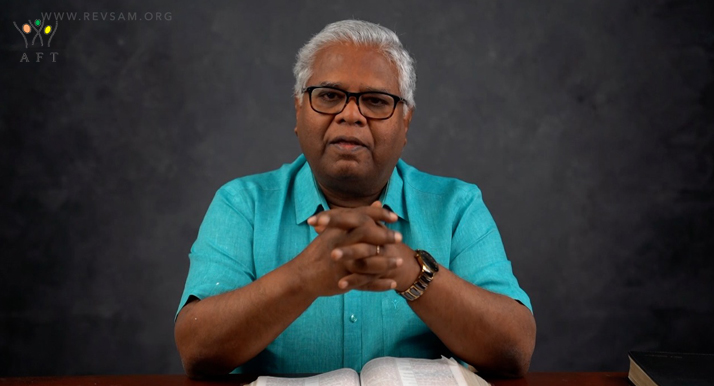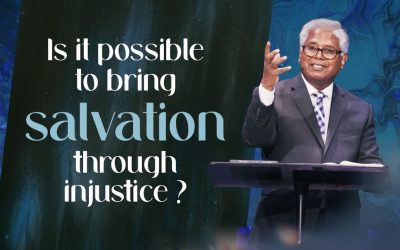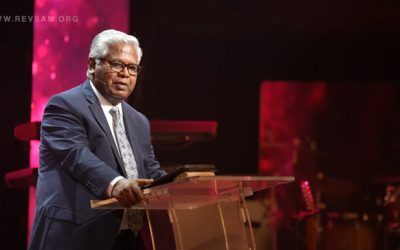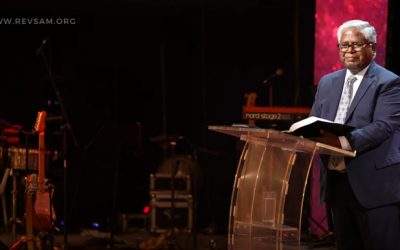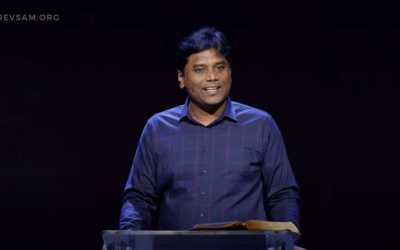
Abounding Grace (Vol 27) – Repentance
Sunday English Service – 03 JAN 21
Transcript
I trust that you’re all doing well by the grace of God. We have come into the new year, 2021. I pray with all my heart and wish that you will have a very blessed year in every way in everything that you put your hand to do, and in every area of your life. God bless you and we’ll and get into our teaching that we’ve been doing on grace. We titled the series as abounding grace, based on Romans chapter five, verse 20, where Paul says, “Where sin abounded, grace did much more abound.” The meaning is that when sin gets into a person’s life, it abounds, means it exerts great power and dominion over that person and ruins and destroys everything, but when the grace of God comes into that person’s life, the grace of God begins to rebuild that person’s life and makes it more beautiful than ever, and than it ever could be.
So this is a truth about God’s grace, and how it works in people’s lives, changing people’s lives. Now, we looked at many things and then finally came to Luke chapter 15 in this teaching on abounding grace. And Luke chapter 15 is about the grace of God and how it changes individual lives, but also it’s about how it creates a new kind of community, new kind of human society. How the grace of God creates new kinds of relationship. That is why in the first two verses, we see that the chapter begins with Jesus teaching and sinners and tax collectors are gathering, coming near to hear him, and seeing that the Pharisees and the scribes criticize because they don’t like the idea of sinners and tax collectors, coming to a spiritual meeting where a spiritual teacher is teaching, because they believe that in a community, a spiritual community, these people should not have a place because they’re unworthy people. They have their own ideas, their own framework of thinking, who can be admitted and who cannot be admitted and so on. So in their mind, these people should be excluded.
So they are complaining about that. And in response to their complaining, Jesus gives these three parables, the parable of the lost sheep, parable of the lost coin and the parable of the prodigal son in order to answer their complaint about admitting sinners and tax collectors into the community of spiritual people. In other words, Jesus is answering their complaint by saying that he has come to make a new community. He has come to seek and save that which is lost, and he believes that all people are lost and some are very steeped in sin and really been broken into pieces, their lives have been damaged terribly like the prostitutes and the tax collectors and so on, the people that they considered sinners. There are others that look good on the outside, they look very religious, but they’re also sinners. So Jesus came to seek that which is lost just like a sick man needs a doctor, the sinner needs a savior, and he has come to seek and save. So the community that Jesus is trying to build will have all these kinds of people, allowed the sinners as well as the people that think that they are saints.
Both will have to realize that it is only the grace of God that gives them admission into this community. The people that consider themselves great saints cannot enter into this community by virtue of their worthiness and qualification. And the people that consider themselves sinners and outcasts of society should not consider themselves outcast of this community because of their sinfulness, because it is the grace of God and grace of God is the thing that gives admission. So this is a wonderful truth, and I want to go into this further. On this particular parable we’re dealing with right now, the parable of the prodigal son, we are told about a family that is ruined by sin. And as a result of the family being ruined by sin, the community is also affected, therefore, the family that is ruined and the community that is ruined is put back together and it shows how it comes back together and how things change here, as far as the individual is concerned, the family is concerned as well as the community is concerned.
So we’ve been looking at the story of the prodigal son. The key theme of this pattern is the repentance, because repentance is crucial for the restoration of this family and this community. Only when there is repentance, then the family can be put back together and the community can be put back together. So we own a deal with a theme of repentance today, through this parable. So we’re going to look at several things about repentance. First of all, I want to look at the importance of repentance, why repentance is important in the scheme of things in grace, what role does repentance play? How does repentance come into this work of grace? Secondly, the various elements of repentance, the various aspects of repentance, so that we can understand repentance more fully. Thirdly, the key to repentance. There is a key aspect in repentance. That is to be understood very carefully and very well. We’re going to deal with that also.
Then finally, we’ll talk about how this true repentance leads to salvation. It’s the repentance, that leads to salvation. Let’s look at the importance of repentance first. What is the key factor that brings this prodigal son to his senses? In other words, repentance does not occur here in this passage. Some people just because the word repentance does not occur, they think the truth is not there. They deal with the whole Bible like that. They’ll say this word does not appear anywhere in the new Testament. That word is not there in the whole chapter, or a whole book or something. Therefore, that is not the subject there. In Bible interpretation, you cannot deal with it like that. Because here in verse 17, in chapter 15, we read about how, when he came to himself, that is when the prodigal son came to himself. Some translations render it as when he came to his senses. He said, “How many of the father’s hired servants have bread enough to eat and to spare, and I perish with hunger.”
So he came to the senses, it says or he came to himself. Now that is a semiotic or Jewish EDM that refers to repentance. So when Jesus was talking about it and saying that when he came to senses, the Jewish people suddenly understood that as repentance. So just because the word repentance is not there, it’s not that that subject itself is not addressed here. Jesus, in this wonderful story tells us about grace of God in salvation and how a sinner comes to repentance and how the work of grace is done through repentance. So repentance is a major theme here. The father already loved the son. The son has lived under a good father, a loving father and a good father. And there comes a point in the son’s life, where he remembers the love of the father and the goodness of the father when he has lost everything. And when he ends up with the pigs, minding pigs and has no food to eat for himself while the pigs are able to eat, then he comes to the senses.
It is at that time he comes to the senses and then he repents. His situation brought him to that level, and then he begins to repent. He realizes that his father loved him, and in his father’s house, he never been hungry. Father has been good to him. It was a wrong thing that he did, that he left his father’s house and came to a distant country and wasted all this wealth. The thing that he did is a mistake and is a terrible wrong, terrible error in his life. He realized that, and the moment he realized that, he takes a radical action. That is, he says, in the next verse, “I will arise and go to my father and will say to him, father I’ve sinned against heaven and before you.” He makes the decision to get up and go back to his father. When repentance happens, that is when things begin to turn around, that is when the love of God and the power of God begins to transform that person’s life.
When repentance comes, then you can expect that change, when true repentance comes, a change in that person’s life happens. That is what is revealed in the story. Now, Martin Luther, the reformer that brought about the Protestant reformation, taught a lot about repentance. You remember in the beginning of the reformation, he posted what’s called 95 thesis on the doors of the cathedral in Wittenberg. There were 95 points where he made there. He saw that the church had gone astray from God planning and purpose, and he listed 95 things. Among them, the first thing was this, is that when our Lord and master Jesus Christ said repent, he meant the entire life of believers should be one of repentance. Listen to that. That when Jesus said repent, he says, that meant the entire life of believers should be a life of repentance. That’s what Jesus meant by that, he said.
So the first point in Martin Luther’s thesis, in which he was laying down his understanding of biblical Christianity. I’m not talking about Christianity’s religion, but biblical Christianity. The Christianity that believes in the gospel of Jesus Christ. When he laid down the foundations of it, basic principles of it, he says that biblical Christianity says that all of life is repentance. Now that’s a very significant statement, but that’s completely different than what the world says. In the world, many great people in the past, I don’t want to mention the names have said that the weak alone repent, repentance, they believe is an experience of disempowerment where you feel drained because you’ve admitted that you’re wrong. And you feel like you’re just nothing, that you’re wrong, you failed, therefore drains you of all your power and confidence and everything. So it is an experience of disempowerment.
Martin Luther says in the Bible that he read; repentance is something that should happen all the time. That’s what Martin Luther believed. Let me just give you a brief look at Martin Luther’s teaching on repentance. First of all, he taught very strongly that repentance is not a sign of weakness. It is a sign of strength, he said. It’s exactly the opposite, he says, of the world. Why does he believe that repentance is a sign of strength? The worldly people can’t see that, they think, well, if a person is repenting saying, I’m sorry, here’s a weekly, he has done something wrong, he says, I’m sorry, and that very admission that he has done something wrong, makes him hang his head down and loses his respect, and he feels very small. So that’s a really a weakening experience they thought. But look at Martin Luther, he says, do you realize how full of joy you have to be, and how loved you have to be able to feel and how strong spiritually and emotionally you must be in order to repent and admit that you’ve been wrong.
When a person boldly stands up and says, I was wrong, that is wrong, I admit that I’m wrong. And then confesses he is wrong and repents of it. He says, do you know how strong the person I have to be to do that? He believes that inability to repent as a sign of weakness, only a weakling would be unable to repent. So to him, repentance is not a sign of weakness, it is a sign of strength. The world says repentance is a sign of weakness, the world says. Luther says that the Bible says that it’s a sign of strength. That’s Luther’s belief on repentance.
Secondly, because they say repentance is an experience of disempowerment where you feel drained because you admit you’re wrong. You feel like you’ve lost something. You feel small, you feel weak. They say it’s experience of this disempowerment. Empowerment is where you empower a person, the person becomes powerful as a result. Disempowerment is where the person feels like is drained of all power. Martin Luther says, no, it is not a experience of disempowerment, it is an experience of liberation. Why? He says, a person who’s constantly repentant lives the life of repentance and ready to repent anytime he has done wrong. Any time he realizes that he has done wrong. Such a person is free, he says. Free from what? He is free from cutting on a pretense and living a life of evasion where he’s got to avoid the issue. He knows that he has sinned. He knows that he’s done wrong. He knows that he’s wrong, but he doesn’t want to admit because that’s a sign of weakness.
So he’s always trying to justify and make every argument possible to justify himself. But a person who repents is free of that. He doesn’t have to do that. A person who repents is free from the need to defend himself with all these arguments. A person who repents is free from the need to prove that others are wrong and he’s right and innocent and so on. So Martin Luther has totally a different view, he says, a person who repents and lives a life of repentance, he believes is a liberated person. He is a person who was quick to repent, but he’s a very joyful person, because he has repented. He has nothing to worry about. He has no tension. He has nothing to make up. He doesn’t have to spin everything, create a story to avoid admitting that, he has been wrong and he doesn’t have to make it look like he had not done it and so on.
Who’s right. Is Luther right or the great men of the world? Who’s right? Is the Bible right or the world right? Turn with me to the second Corinthians chapter seven and verse 10, there’s the wonderful verse here. And that says, there are two kinds of repentances. There is a true repentance, a spiritual, divine repentance, that brings a definite change. And that is that another worldly kind of repentance that does not bring any change, but it makes matters worse and literally leads to death. Listen to this. For Godly sorrow produces repentance, leading to salvation. When a person commits something wrong, he feels, sorrow, he feels sorry in other words, for what he’s done. And because it’s Godly sorrow it’s because it is God convicting him and bringing him this repentance, the sorrow, it’s leading to repentance. That sorrow leads to him repenting and admitting before God, what he’s done wrong.
And then as the result, it leads to salvation, he says, it’s good. It’s a spiritual repentance, but listen to this. But the sorrow of the world produces death. What does this sorrow of the world? Sorrow of the world is where a person in the world knows that he’s done the wrong and he sorry for it, he feels bad, but he doesn’t want to admit it because everybody will think it’s a sign of weakness that he is failed. He doesn’t want that kind of reputation that he has failed. That’s the sorrow of the world. He knows that he’s done wrong, but he doesn’t want to repent. It doesn’t lead to repentance, and it doesn’t lead in turn to salvation. True sorrow, a sorrow that comes as the result of God convicting you, leads you to repentance and that repentance leads to salvation. This worldly sorrow does not lead to repentance and therefore doesn’t lead to salvation instead it leads to death, leads to a lot of trouble where the person has to go around spinning the story, lying and proving that he’s right, defending and arguing and hiding and so on, evading and doing all kinds of things. So there are two kinds of repentance in that way.
So we considered the importance of repentance. Martin Luther feels that repentance is absolutely important to spiritual life. Christianity is known by this fact that those that are Christians are repentant people. They’re ready to repent. They live in a life of repentance, he says. That’s how important repentance is, is key. Secondly, the various elements of repentance, that’s what I want to look at, the various aspects of repentance. Now, there are three things about repentance that you can learn from this story, the prodigal son. One is that repentance is basically coming to your senses or coming to yourself, coming to terms with yourself or coming to your senses. Now, how does this happen? Does it happen like you wake up from some kind of a sleep or some kind of a trance or delirium or something like that. The stage of delirium? No. Doesn’t happen like that. It happens in this way. Let me give you an example.
When sin is in people’s life, it leads to a lot of loss in life, a lot of character shortcomings and so on because sin is like that. It produces certain differences in life. For example, it manifests itself as selfishness, self-centeredness that’s one problem with sin and when self-centeredness comes into a person, that ruins everything, he cannot be happy. That kind of person has an inner conflict, even if there is no one else in his life, he will be at conflict within himself. He will not be happy because he’s self-centered if he is not doing well, he’s angry at everybody else that is doing well. He is always in a state of tension, creates a problem within him because he is self-centered, thinks everything revolves around him. Another manifestation of sin is pride. The devil is full of pride, and therefore he fills people with pride and God resists the proud, the Bible says. So pride is another problem. And pride is there, you can see families being destroyed by these things. Self-centeredness destroys families, it destroys the relationships, it destroys happiness of individuals and society because when a society consists of people that are self-centered, there can be no happiness, no prosperity. There cannot be true happiness in that society.
When a society is filled with pride, pride of the unhealthy kind, that creates all kinds of animosity, that society cannot prosper, that cannot do well. The people in that society will have a lot of problems because of the pride. It always disrupts peace. So when these things come, you see sin operating, and when sin operates in a person’s life and self-centeredness and pride and all of these things work, there’s a lot of problem in that life. You will see a lot of things happening because you will see things breaking. You will see things going wrong. And the thing is, people live in denial of them. To tell a proud person you’re proud, he’ll never accept because he cannot see it. You tell a self-centered person he’s self-centered, he’ll never accept because he cannot see it. They live in a denial, just like cars on petrol, a lot of human beings are on denial. They get a refill of denial. They constantly live in denial, sometimes live through the whole life in denial. It’s there, it’s causing all kinds of problems. It’s tearing them up. It’s destroying their peace, but they live constantly in denial.
Now, repentance is the moment in which you come to your senses, and you realize that you’ve got these problems, and how does it happen? How it happens is this, I just talked about sin and its various manifestations. Self-Centeredness, pride are two of the most important manifestations. When that comes into life for example, it begins to destroy life, destroy society, destroy marriages, destroy relationships and so on. So there’s a lot of strains that are happening as a result of sin operating in that person’s life, strain within his own life and strain in his relationship with others and so on, because of the selfishness, because of the pride and so on. Causes a lot of problems, it does a lot of damage and when the damage really brings the bottom meltdown where everything is damaged and gone like this guy, he went out of his father’s house, took his wealth and went and lived a rioter’s life, did not want the control of his father, wanted to have fun. And he had a meltdown, completely lost everything. Penniless became very poor. Pigs are eating, but he doesn’t have anything to eat.
Now when he came to that level, that is when he came to his senses. Something happens in our lives also when sin comes in and damages us and does that terrible work of damaging and ruining everything, just like it did in this young man’s life, in the story of the prodigal son. When the damage is great, when it comes and you feel like it’s catching the neck and you cannot survive anymore, that is when you cry out to God. A lot of people don’t think about God until the last moment, until everything is gone. They have no time to listen to God, consider God, consider any kind of thing. Only after all doors seem closed in no way possible, then they look to God and then all of a sudden it dawns on them, they have been wrong. So they say, for example, wow, how did I ever do what I did? What have I been doing? Why have I been such a fool? How could I have thought like this? How would I have lived like this? How could I have been idiot like this? They’ll think these things.
This guy, this prodigal son, if you told him, when he asked his father for his wealth, for his share of his wealth. If you told him it’s not good for you, you better stay at home, you need your father, don’t go away. He would not have listened because he’s in his own world, he is deep into sin and sinful thoughts are occupying his mind. He’s just thrilled about going out, living a rioter’s life, doing all the things that he ever imagined to do in a sinfulness, so he won’t listen. But there comes a time when everything breaks down and he comes to his senses and it happens many times by the circumstances of becoming very severe. And at the same time, the spirit of God also is working in the heart. Not just the circumstances because otherwise everyone that’s in the bad circumstances will realize and come to their senses. Some people don’t even come to their senses when situations are wrong. Many times, these things that used by God to convict a person and to speak to a person and to turn a person’s heart towards God.
Repentance is a divine work that happens in a person. You read in the book of Psalms, many times, turn us to God, and we will return to you. That’s a very small verse, but it’s loaded telling us means we can turn ourselves. We are incapable of turning ourselves. Repentance is really turning around. We’re going in this direction, you realize that you’re in the wrong direction? All of a sudden you will make a turn right around and go in the opposite direction. That is what repentance is all about. It is rethinking and realizing and things dawning upon your heart and mind. Therefore, you turn around and how does it happen? It happens as a result of the work of the Holy spirit in the heart and mind of man, that is how it happens. God turns, God causes the turning. So they said, turn us oh God, and we will return again. We’ll come back to you, turn us again. So when repentance comes, by the work of God, in these many circumstances, you should respond to it, like this guy did. He responded to it. He said to himself, I’ve done wrong. I’m going to go. I’m going to rise and go to my father.
Secondly, repentance is vertical. Firstly, repentance is coming to your senses. Secondly repentance is something to do with your relationship with God, because look at what he says. He says, “I’ll arise and go to my father, and I will say to him, father I’ve sinned against heaven and before you.” Now people hear this verse and say, against heaven, how did he sin against heaven? In this story there is a father and two sons. One son asked for his inheritance, his share of his inheritance, and went out and wasted it. So he’s coming back. What has he done? He’s done wrong against the father who gave him the wealth. Why do you bring God in there? Why does he say in this story, I’ve sinned against heaven and against you. And moreover, he puts sinning against heaven first, even before the sin against his father. Why? I want you to go to Psalm 51, where we have an interesting sermon of repentance.
Remember David in his young age, God used him wonderfully, and when he became a King, he abused his power and committed two great sins. One is, he killed a man to take his wife for himself. Double sin. One is adultery and the other is murder. Killed the man to take his wife. And God sends a prophet to him, and this prophet reveals what he has done and convicts him. And then the Psalmist writes this Psalm 51. It’s a song of repentance. And look at these words in verse three onwards, for I acknowledge my transgressions and my sin is always before me. He has sinned. Now his sin is always before me, he says. Against you, and you only have I sinned and done this evil in your sight. He’s telling God, Lord against you and you only have I sinned.
Now when people hear this, they say, wait a minute, he has sinned against that man, that’s a soldier of his, a fateful soldier who was in the front lines fighting for him. That’s his wife. He sinned against that man who trusted him, who worked so faithfully for him. It was a great sin against a man, such as that. And it is a sin against that woman, because that woman is an ordinary citizen of that country, and this man is the King. When the King calls, no woman can resist. She’s powerless, therefore he is to be blamed. So he used to be blamed for what he did against that man and that woman. But he doesn’t even mention that here. He says against you and you only have I sinned and done this evil in your sight. People don’t understand sin. They understand the thing about I did against this person, I did wrong against that person. That’s a sin against this person, but they don’t understand that sin is essentially something that you did against God. The Psalmist says that, against you, only have sinned. Why?
Did he say he sin against God? Yes. What was his sin? Here is the problem is self-centeredness. That’s where he killed that guy. Sin has gotten into his life. He wants his own pleasure, wants his enjoyment. The more important than honoring his friendship with the other man, the 10 commandments clearly says, thou shall not lust after another man’s wife. But he did that because his enjoyment came ahead of everything else. It justified his doing this. Self-Centeredness has come in. And that led to the sin of committing this adultery and killing this man. What he has done is something wrong against God, because God has made us to live in a certain way. Just like cars are made by the makers of those cars to run on a certain principle. Some cars are made as diesel cars, you got to put diesel in it to run it. Some cars are made as petrol cars, you’d need to put petrol in it.
You cannot change that. That is made like that. The creator of those cars did it like that. You have to honor that, you have to go by that, you need to find out whether this needs diesel or petrol and you have to just give it what it needs, then only it will run. Similarly, the God who created us, we are better than cars. Look at this machine here, spirit, soul, and body, three aspects to a human being. God created us, wonderfully created, just talking about our body, the Psalmist says, we’re wonderfully and fearfully made, amazing is the creation of Man. God who created us, created us a certain way and created us to function in a certain way, and when you don’t function in the way that he has created us to function, that’s when everything goes wrong, everything breaks down. Just like putting petrol in a diesel car. Everything goes down because you are not functioning in the way God has created you. God didn’t create man to function in this way, to lust and go after another man’s wife. No. This man does it. Everything breaks down. His whole life was in disarray, after that.
It was a sin against God. It is a sin against God that resulted in this action, hurting other people and so on. But it’s basically a sin against God. It’s against God’s principles. It’s against the way God ordained life. It’s against the way God ordained life to function. So here he has sinned against God and he admits that he has sinned against God. Now, why is it important to admit that it’s a sin against God? Because unless you realize that it’s a sin against God, there cannot be true repentance. Who are you going to repent to? You’re going to repent to a man? Unless you realize this as a sin against God, you cannot bring true repentance there, and when true repentance doesn’t come true change cannot happen. Say for example, there’s a husband and wife, both are fighting and the fighting really gets very intense, and the woman packs her bags and wants to go back to her father’s house.
So finally, this guy gets afraid because he doesn’t want to lose his wife. He cannot live without his wife. So he feels some kind of a need for his wife. And because it will bring shame on him and it’ll bring a lot of questions and it’ll bring a lot of problems for him. He doesn’t want to face all of that. That’s going to cause pain, because she’s packed her bags and ready to go. So he convinces her that both of them will go to a counselor and find some advice for their situation and then do whatever they decide to do. So the both of them go to a counselor and they sit down with a counselor and there he is crying. He admits that it’s his fault, and he promises to reform. So the counselor gives them all the guidelines and they come back home every day was a day of improvement because here he is. Brings some changes into his life, and the wife was surprised. She had all her bags packed, ready to go and after a few days, she finds that this guy is day by day, changing his ways and he’s becoming better, so she decides to stay. So she unpack and shows that she’s willing to stay.
Once she unpacks, and he realizes that she’s not going to leave, he went back to his old behavior. Now he’s assured that she’s going to stay. You know what is happening here? No real change came here. There’s some change temporarily, but the old behaviors showed up again. He got back into his origin old sinful ways. Why? Why did this temporary change and then why didn’t he change permanently? Because there was no true repentance. Why there was no true repentance, because why did he go to the counselor? He went to the counselor to deal with this fact that it’s going to cause him pain if she leaves. He’s going to be in trouble, he can’t take it. He can’t live without her. So he went to the counselor to deal with this pain so that he can avoid this pain. He can save himself this pain. He wanted to deal with this pain, but not deal with what caused the pain. How did the pain come? Because of his behavior and where the behavior come from? It came from his sinfulness.
What is sin? Is a thing against God. Is violating the way that God has ordained for him to live. That’s where it originates from. Unless you deal with it, this pain can never be permanently dealt with. Now, he’s trying to deal with the pain without dealing with the cause, that is not true repentance. True repentance is where you deal with a sin that you’ve sinned against God. It’s against God. You realize that this is something that is against God. You realize that what you’ve done is not just against another person, it’s not just a simple thing as that. It is against God. And therefore, you begin to deal with it in that way.
There was a man named Stephen Charnock, a great writer many years ago, great theologian that lived long time ago. He written a lot, and he writes about the difference, the big difference between a self-pity kind of repentance and true repentance, this false repentance and true repentance. And he says this, it is very significant. He says, a legal conviction of sin that arises from a consideration God’s justice chiefly. There is a kind of conviction that can be called legal conviction. What is that? The person realizes that God is a God of justice, is a God of power and justice. He has said live like this. This is the right way. Just like the country has laws, and you’re to obey. He is a God of laws. So you violated that law and therefore you’ve done something wrong. And my God, he’s a God who created the heaven on earth, with just words, he’s so powerful. Now you shutter before him because you have sinned against this mighty God who knows what He’s going to do to you, with one word he just created everything. When He said, let there be light, this universe came about. How much damage can be caused when he opens his mouth against you, because you’ve now violated his law.
So there is a conviction that looks at sin like this, it’s a violation of God’s law. God is a God of justice. He’s powerful. I violated his law. My God, God saved me. God helped me. That kind of conviction, but there’s another kind of conviction and I will call it a gospel conviction. It’s a conviction of sin that is true and leads to true repentance that arises from a sense of God’s goodness. Did you hear that? There is the conviction that arises from your awareness of God’s justice and God’s power. And there is this conviction that arises from a sense of God’s goodness. When you realize God’s justice and power, you know that you’re violated, you are on the wrong and who knows what God is going to do. God is going to thrash you now. And that’s the way you were buying things. And God helped me, save me. You shuttered before Him. But when you realize that you violated the goodness of God, that God has been kind to you, gracious to you, done so much for you, but you have violated His word. You’ve gone against Him. You have done wrong against Him. You have hurt His heart. When you realize that says, there’s a big difference when a person realizes the he has sinned against God’s laws and He’s powerful, He’s going to do something.
That person is very likely for some reason later on to go back to his sin, suppose he doesn’t see that God is immediately not coming down with His judgment or something like that. He’s going to go back to his, think that God is not going to deal with him or something like that. Because I thought God would send some fire and consume me, but nothing has happened, happily, I’m going to go back and do what I’ve been doing. That’s the way he thinks. He believes in God’s power and all that, but nothing happens. So now he thinks maybe, I’ve got a break here. I can continue in this lifestyle. But this guy who feels that he has violated God’s goodness will not go back to his sin because he understands sin in the right way. Now this is the wonderful explanation that Charnock gives. We need that kind of repentance. That’s the true repentance.
Thirdly, repentance is horizontal. I said, repentance is when you come to your senses. Secondly, repentance is vertical. It has ruined the relationship with God. Thirdly, repentance is horizontal. It is also something that has happened between you and others here. Because sin happens this way between God and you, you’ve violated God’s principles, therefore these things are happening on the horizontal level with others. That’s what the prodigal son says. Listen to him. He says, “I’ve sinned against heaven, and before you.” That is a horizontal aspect. I’ve sinned against heaven, but I’ve sinned before you. Why did I sin before you? Why did he take his father’s wealth, his share of his father wealth? Why did he hurt his father like that, while he was still alive, he took his share. Why did the thing happen? Because of his sin against God, sin has gotten into his heart. He wanted to go and live a wild life. He was seeking after that kind of thing, his father was a hindrance. That is why he hurt his father and took half of his wealth and went away. So he’s got a horizontal problem.
How does he solve his horizontal problem? He comes to the father and he admits this problem. I’ve sinned against you, I’ve sinned against heaven, but I’ve sinned against you. He doesn’t come and give excuses. He doesn’t say father I’ve sinned against you, but do you know what? You know why that happened, because this brother of mine, this elder brother of mine, he’s is full of junk. Nobody can look at him and I’ve been staying in the same room with him. Oh, I cannot stand him. I want her to get away far from him. That’s why that thing drove me away from this house, you know that. A lot of people will find some excuses or he didn’t say father I’ve sinned, yeah, I admit I’ve sinned, but you know, I’m young and which young man hasn’t sinned, tell me. I’m young, that’s why I sin, that’s why I did this, understand that. He never gave those, sin is sin. Whether young, old, whatever, sin is sin. So he says, I’ve sinned against you. I’m ready to set that right. I have sinned. That is true repentance.
Then thirdly, the key to repentance, this is the very important point that we need to make here. The key to repentance. Let me read to you. He said he will arise in verse eight, and go to his father and say to him, father, I have sinned against heaven and before you, and then look at verse 19 and I am no longer worthy to be called your son, make me like one of your hired servants. Now, it’s a very key factor here. What is he doing? In that culture, in a house like that, where there’s a lot of people working and so on, there are two kinds of servants. One is domestic servants, people that stayed there, stayed in the house, ate there, lived there and part of that whole setup, whole family, they are part of the family. They lived there and worked there, and ate there and so on. And then there are hired servants that come on a daily basis from outside. They lived in town and came and worked and got their wages and went back. Two kinds of servants, domestic and hired servants. The mentions particularly hired servants here.
He says, “I’m not worthy to be your son.” In other words, what he is trying to do is he’s trying to tell his father, look, I know I’ve gone and wasted all the money. I took my share of wealth and I’ve already finished everything. I have no right to claim a status in your home. I don’t have any right to claim to be your son. I have no right to claim food or the ability to stay here and so on. So I am asking, give me a job. I’ll be a hired a servant. I’ll stay outside. I’ll come every day and work. I cannot expect to live in this house for free. I cannot expect to be a part of the family. I cannot expect to have the privileges of a son, that is too much. I’ve forfeited that. I’ve finished with that. I cannot ask that, and I understand that, and I don’t want that, I don’t want grace. Give me a chance to work out my salvation. Give me a chance to go out there and work in your fields, work with your cattle, make my money. And day by day, I’ll pay back everything that I took from you, and one day I’ll be all paid up and then I can come and say, father, I took this much from you, I’ve returned this much, can I now come back and be your son? Because I’ve paid for all the damages. This is what he’s trying to say.
Amazing how Jesus brings the situation here. That’s exactly what he’s trying to say to the father, when he said, I will go to the father and say to him I’ve sinned against heaven and you, and I’m not worthy to be called your son, let me be a hired servant. That’s what he means. A chance to work out his own salvation. No grace, by works I’ll make it. And this whole parable is against it. Here you have a middle Eastern father sitting in his home, just imagine. And this boy, after he wasted all the money, he is coming and the father sees him from afar. What do you think his response was? You think his father sat there and looked up through the glass window there and saw the son coming in rags, looks like a beggar and the father’s heart said, let him come, this better be good. He better have some excuse. Let him come and crawl on the floor. Let him come and cry. Let him come on and knock a hundred times on my door. Let him come and sit there and wait. I’ll make him wait, I’ll show him who I am. Is that what the father was thinking? No. Was he thinking well, if he cries enough and begs enough, and if he repents enough, then I will maybe some love will come in my heart for him. I’ll begin to love him and I’ll show them some love, and I’ll admit him and I’ll give him some food and give him a corner of the house to stay. Is that what he’s thinking? No.
This middle Eastern patriarch was different. He looks out and sees somebody coming and he looks and says, is that my son, looks like him. Boy, he is in rags, my God, but I’m glad he’s alive. He’s not worried about how much money he has spent and how much money he lost and how much wealth is gone and all that. He doesn’t care about all those things. His mind is not thinking in those terms at all. His mind is only thinking my God, my son was lost and he’s back. And so he gets up from where he is sitting and runs to the son. They say the middle Eastern father will not run like that. He’s got to pull up his clothing, just like a skirt and run, a woman will run in that society, they say, and a boy will run, but not the father, they say. But this father gets up from his seat and runs. The son is not running. He’s running. He is running, and the Greek language says it seems that he goes and puts his hand around his neck and hugs him and kisses him and welcomes him.
Not only welcomes him like that, but puts a robe on his rags, on his raggedy clothes, he puts on a very nice robe, tells them to bring the ring. And the ring is not just an ordinary ring like these days, a ring meant in those days that it’s a sign of belonging to that family, because that ring is used to seal the documents in which you make contracts and so on. So he is now accepted into the family. He’s able to make contracts as part of the family. He’s got signing authority.
Then a feast is organized, fatted calf is killed. Feast is called for, musicians are called, dancing is going on. There is a celebration and rejoicing, totally different picture. Before, the son could open his mouth and recite all he has got ready as a speech to his father. I’ve sinned before heaven and sinned before — father never listened to all that. That does what the son said, he is going to say. But he had no chance to say. The son thought he’ll say to the father, I’ll be a hired servant, not as — I won’t claim sonship. But the father gave no place for that. Even before the son said any words of repentance, the father went and hugged him, embraced him and took him into his family. You need to remember, this is a parable. It’s a story that Jesus says to really teach us about this whole work of God’s grace in salvation. What is he trying to say here? What is he trying to convey here?
The father in the story is God, and the younger son is the sinner. Sinner like one of these sinners, the prostitutes and tax collectors, these sinner’s kind that was all broken and so on. He’s coming back and how he is being received. That’s what he’s addressing there. Just imagine the audience is those kinds of people that are listening. The sinners of that kind as well as the Pharisee and scribes, he is talking to both of them. He’s talking about why is he receiving a sinner? Why he is receiving such a failed person? Why he is receiving such a vital sinner? A sinner is gone and lived his life with the prostitutes and coming back after wasting all his wealth, why is he receiving, why would he receive such people, unworthy people that Pharisees say that are not be received. Why is he receiving them? That’s what he’s addressing there. This is a real terrible slap on the face of the Pharisees, and the scribes is showing them something about the grace of God.
He means to say there are two different ways of thinking. They are thinking this fellow should not be admitted. He’s done wrong. He doesn’t deserve anything. The sinners are not to come into the assembly of the saints. That’s what they think. But Jesus is saying, look, there’s a difference between religion and true Christian repentance. I want to show you what true Christian repentance is thinking. What is religion? What is religious repentance? Religious repentance says, well, I need to go to God, but I need to get myself right first. I need to do some good works, I need to go with some worthiness so that I can have a standing with God. I’ve done this and this and this, and I’ve lived for you and I’ve done this and done that and so on, and I can claim some credit. I must go with some good standing, I must go with a good record. So they saw their source of power, the source of their confidence and hope in their good record. The good record is the source of their power, confidence, and hope. When they went to God, that God would answer them, that God would receive them. That God would admit them. How do they know? They say our confidence and our hope is based on the good record that we have.
That’s the approach of religion. That is why this kind of religious repentance, not the true repents, but the religious repentance can be a disaster. Why? Because that repentance separates you from your source of power. What is your source of power? Your source of power is your good works. Your source of power is your good record. So when you repent you say, I’ve done wrong, now then that means you can’t come. You need to be able to come saying I’ve done right, without that good record, you cannot come. That is why religious repentance is a disaster because that doesn’t work. Because when you come repenting religiously, you have to come saying I’ve sinned, and that meant religiously saying, I’m unworthy, I cannot receive anything, I’m unworthy of any blessing. That is why religious repentance is a disaster. Another thing is religious repentance, not only says that you don’t have good record. Religious repentance always leads to some kind of attempt to do some atoning work for your own sin.
You want to atone for your own sins. You want to make up for your own sins. That is what this guy was trying to do, he says, I’ll be a hired servant, I will work, I’ll work my way through. Atone for your sins. Since I have no record and I’ve sinned and I’m unworthy, and I cannot claim anything to you by my own record, good record, I don’t have a good record, so I’ll work. I don’t want to be a son, I know I’m not worthy, I’m not asking you for that, but I will work very hard. I will try to be good. I’ll try to be faithful hereafter. I’ll try to behave hereafter. That is why the religious framework of repentance is a disaster. One, it tells you that you’re hopeless because you don’t have a good record, and then it tells you because you’re hopeless, you have to atone for your own sin. And how do you know when you’ve done enough to atone for your own sin? This is atoning for your own sin is a disaster because it can be endless. It can go on and on and on. And it can be a never-ending thing. Nothing that you do will be enough. How, and when do you know that you’ve done enough for your own repentance? How have you done enough for your own wrongdoing?
So everything in this parable teaches against this whole idea that the Pharisees were holding. The Pharisees are sitting there and listening. Sinners are sitting there and listening, both of them are listening. Just imagine what they’re feeling. Pharisees know he’s talking about them, their idea, he’s knocking it, he’s thrashing it. He’s grinding it into a powder. He destroys their idea, their theology of how they are thinking. They’re thinking we have to come with some good words. We got obey all these things and we have to come and show that we have done all these things, or if you have not done all of this, you have to be able to atone for your sins and you are to be ready to do whatever to make up for that. And Jesus says, now get off. This whole parable does not agree with that. What does this parable say? This parable says, that this father, without any of these things, without expecting anything like this from the son, goes running to the son, before the son even arrives, he goes and gets him. He goes and hugs him, he goes and kisses him, he goes and puts a robe on him, he goes and puts a ring on him before he speaks one word he’s already taken into the family, already the celebration has started. That’s the kind of father he is.
That whole idea is rejected. He trashes that idea, that religious repentance doesn’t work, he says. You need to have true Christian repentance. What is true Christian repentance? The religious repentance, that’s useless because it always tells you you’re worthless, and you have atone for your sins, but the gospel repentance, the true Christian repentance connects you to the source of your power. What is the source of your power? The source of the religious people’s power is in their good works, in their good record. The source of the one who comes with Christian repentance is through repentance, the source of his confidence and his hope is on, not what he is done, but in what Jesus has done.
Now, it’s very significant that Jesus is telling the story. Now just imagine Jesus is the savior. He’s going to die on the cross for all of our sins and at that time, when he was telling the stories, that must be in the back of his mind, that is what he’s getting at. That this guy is coming. He’s not coming bringing his good record, neither is he going to be allowed to atone for the sin because I have come from heaven for that. I am going to atone for the sin. I’m now going to create a good record on the basis of which he’ll be blessed. I’m going to do it all, therefore I accept him without any good record, without atoning for himself, I accept him as a sinner and I’m ready to transform and change him and make him a new man. So he takes him in. What do you think would Jesus have been thinking at that time? So you hear this fellow is in rags, he is naked, he’s crying out and the father opens the door and receives him, puts a robe on him, prepares a feast for him, puts a ring on him. There is a big celebration, yet at the end of Jesus’s life, where he took this fellow sin on himself and all the prodigal son’s sin upon himself, he took the sin of everyone in the world upon himself and God placed the sin of the whole world upon himself and made him a sacrifice for their sins.
When he did that, he was stripped naked. He was in rags literally on the cross hanging there, and he cries out my God, my God, why has thou forsaken me? God’s door didn’t open to welcome him. God, in fact turned his face away. God didn’t put a robe on him. He was disrobed. God didn’t prepare a feast for him, instead they gave him just vinegar in his mouth. He was stripped naked for our sakes. So that we will be clothed with God’s love. He got the rejection that we deserve so that we can get the welcome into God’s family. Even before we repent, God is on us, just like before the prodigal son came back and repented and got right with the father. The father ran to him and hugged him and kissed him and welcomed him and put the robe on him and everything on him. Even before we repent, God is honest. God is robbing us. God is kissing us. God is feasting us, celebrating our return. So when you repent, you simply remember that you are saved by his grace. It’s not even because you repented or before you even repent, he’s out there. He’s welcoming you. What an amazing grace it is. He came to seek and to save that which is lost.
It’s an amazing story. Just think about that for a moment. I think if you’re a believer like me, you will rejoice in this grace of God. Today, we are the recipients of God’s grace. We are in God’s family in this great gathering of the saints, we are there. Not because of our qualification, not because of our good works. Not because we are toned for ourselves. No. Because he did it all. He’s our savior. We simply put our faith in him. We were sinners, but we came to him just as we are. He accepted us, by his grace, he admitted us. This is the story. So your heart should rejoice in him. You should be glad in him. You should sing his praises. You should lift up your hands to him and give him thanks and give him praise for what he has done for you, if anybody is looking at the whole Christian faith from the eyes of a person, like a Pharisee on the basis of your own righteousness, you need to put that down today because that will never get you anywhere. That is not the way to enter in to this family of God. The way to enter into this family of God is to realize our sinfulness and realize his grace is the only way to enter in. That’s the way you enter.
And if you’re like this prodigal son, and if you are a mess, if you’ve created a mess for yourself, if you are in pieces, if you’re a broken person, if you’ve created a mess for your life and you’ve destroyed your life, and you think that there’s no hope for you, and you wonder whether there is any chance, whether that is a second chance or a third chance. I say to you, yes, that is in Jesus Christ. There is another chance for whoever you were and whatever your condition may be, and whatever your present state may be. If you will just lift up your hands and open your heart and say, Lord Jesus, I come to you just as I am, you help me Lord, you change me. You rule over my heart. You guide me into a new life. He will do that for you.
How to live by faith during evil times? | Habakkuk 1:1-17 | Sam P. Chelladurai | 7-Jan-23
தீமைகள் நிறைந்த சூழ்நிலைகளில் விசுவாசத்தினால் வாழுவது எப்படி? | Sam P. Chelladurai | 7-Jan-24 | AFT
தீமைகள் நிறைந்த...
தேவன் பேசியிருக்கிறார்! நீங்கள் விசுவாசிக்கிறீர்களா?
தேவன் பேசியிருக்கிறார்!...
God has spoken! Do you believe it?
God has spoken! Do you...
ஆராதனையின் புதிய ஏற்பாட்டு அடிப்படைகள்
ஆராதனையின் புதிய ஏற்பாட்டு...
New Testament basics of Worship
New Testament basics of...
இயேசுவில் உள்ள தேவ மகிமையை ருசித்துப்பாருங்கள்! (பகுதி 2)
இயேசுவில் உள்ள தேவ மகிமையை...
Taste and see God’s glory in Jesus! (Part 2)
Taste and see God's glory in...
இயேசுவில் உள்ள தேவ மகிமையை ருசித்துப்பாருங்கள்!
இயேசுவில் உள்ள தேவ மகிமையை...
Taste and see God’s glory in Jesus!
Taste and see God's glory in...


